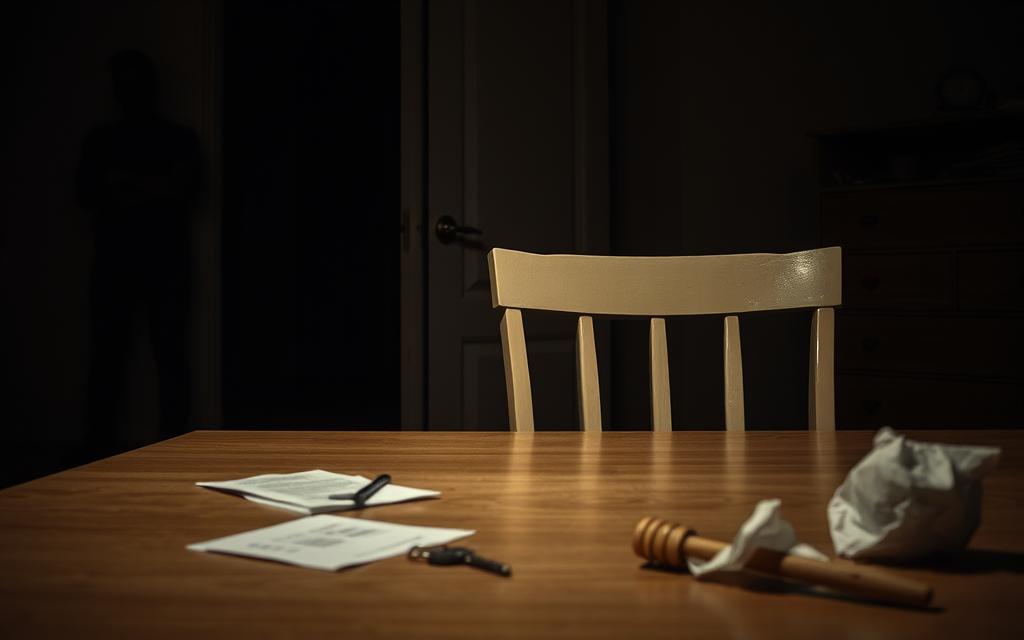Have you ever suspected your partner of cheating? If yes, you’re not alone. About 20% of men and 13% of women admit to cheating. Facing a cheating spouse is tough, but it doesn’t have to be impossible. So, how do you confront a cheating husband or wife?
In this guide, we’ll explore how to face a cheating spouse. We’ll cover the modern cheating landscape, the emotional challenges, and how to gather evidence. By the end, you’ll know how to tackle this situation with confidence.
Understanding Infidelity: Statistics and Modern Reality
Infidelity is a big problem in relationships. Studies show that about 20% of married men and 13% of married women cheat. The workplace is a common place for these affairs, with 30% starting with a coworker.
Common Reasons Behind Infidelity
Feeling emotionally disconnected, not being sexually satisfied, and having the chance to do so are main reasons for cheating. The internet and social media have made it easier to find someone to cheat with without being caught.
Impact of Technology on Modern Infidelity
The internet has changed how people cheat. Online dating and social media give new ways to have secret affairs. This has made it harder to know what cheating really is today. Emotional affairs, made easier by technology, also cause trust issues and breakups.
Demographics of Cheating Partners
Age and gender play a part in who cheats. Older men, 65 and up, cheat more than younger ones. Women aged 50-59 cheat the most. Among millennials, more men and women cheat, with 13% of women and 15.9% of men admitting to it.
Knowing about infidelity helps couples deal with it. By understanding why people cheat and how technology affects it, they can work on trust and strengthen their relationship. Infidelity Hub offers help and advice for those hurt by cheating.
Recognizing the Signs of a Cheating Spouse
Dealing with a possibly unfaithful partner is tough. But knowing the signs of cheating can help you catch it early. Look out for changes in behavior, more secrecy, and different ways of talking.
Watch for emotional distance, less intimacy, and unexplained money spending. Changes in how they look, their daily routine, and social media use might also point to cheating. A study shows cheaters are good at spotting lies, so trust your gut if something seems wrong.
Changes in how they show love, like giving more gifts or being less physically close, could mean trouble. Also, sudden money problems or large purchases might indicate cheating or addiction. If they accuse you of cheating, it might be a way to avoid being caught.
By noticing these signs of cheating and behavioral changes in unfaithful partners, you can act fast. This might mean going to counseling or making tough choices about your relationship.

Emotional Preparation Before Confrontation
Discovering your partner’s infidelity can be very hard and emotional. Before you talk to your cheating spouse, it’s key to prepare emotionally. This helps you stay calm and make smart choices.
Processing Your Initial Reactions
When you find out, you might feel anger, hurt, and disbelief. It’s okay to feel these things. Journaling, talking to friends, or seeing a therapist can help you deal with these strong feelings.
Setting Clear Personal Boundaries
- Think about your non-negotiable boundaries and what you’ll do if they’re broken.
- Think about what you want to happen during the talk, like getting the truth or figuring out the future.
- Make sure your goals are realistic and achievable.
Managing Expectations
Go into the talk with realistic expectations. Your partner might deny it, get defensive, or even blame you. Be ready for this and stay calm and focused on what you want.
Getting ready emotionally is key to staying calm and making good choices about your relationship. By dealing with your first feelings, setting clear rules, and knowing what to expect, you can face this tough time with clarity and strength.
Gathering Evidence of Infidelity
When you suspect your spouse of cheating, it’s key to gather proof first. This might mean collecting texts, emails, receipts, or getting witness statements. Using tech like GPS or apps can help, but make sure it’s legal and right.
Think about hiring a private investigator, suggested by a lawyer, to help find evidence. Look at the evidence’s credibility and patterns to understand the cheating fully.
Remember, finding proof of cheating and collecting evidence of infidelity are important steps before talking to your spouse. It helps you decide and supports you in the tough conversation that’s coming.
- Collect text messages, emails, and other digital evidence
- Get receipts or financial records that show odd spending
- Find witness accounts from people you trust
- Use technology, like GPS or apps, carefully and legally
- Ask a private investigator, suggested by a lawyer, to help find evidence
- Look at the evidence’s credibility and patterns

By carefully gathering evidence of infidelity, you’ll be ready for what’s next. You’ll make better choices about your relationship’s future.
Confronting a Cheating Husband or Wife
Talking to a cheating spouse is hard, but it’s a must. It’s key to pick the right spot and plan your words carefully.
Choosing the Right Time and Place
Find a quiet, neutral spot where you both feel safe. Don’t talk about it in public or when you’re upset. Wait for a calm moment when you can both focus.
Planning Your Conversation Strategy
Think about what you want to say before you start. Use “I” statements to share your feelings. This helps avoid making your spouse defensive. Be clear about how the cheating has hurt your relationship.
Managing Your Emotional State
Stay calm and composed to start a good conversation. Use deep breathing to relax. Your aim is to talk openly, not to attack. Be patient and keep the conversation from getting worse.
Dealing with cheating is tough, but the right approach can help. Choose the right time, plan your words, and keep your emotions in check. This way, you can have a meaningful talk about your relationship’s issues.
Common Reactions from Unfaithful Partners
When confronted about their infidelity, unfaithful partners can react in many ways. It’s important to know these reactions to prepare for the conversation. This helps manage expectations during the confrontation.
Some cheating partners may deny their actions, saying they didn’t do anything wrong. Others might get angry, trying to shift the blame. They might also say their partner is overreacting or invading their privacy.
But, some unfaithful partners may feel remorse and want to fix the relationship. They might apologize and show they’re willing to rebuild trust. Yet, not all cheaters will react this way, as some may still justify their actions.
The reactions from unfaithful partners can be hard to predict. It’s key to approach the conversation with empathy and patience. Understanding the emotional responses that may come up is crucial.
Being ready for these helps you handle the conversation better. It increases the chance for a meaningful talk, no matter how your partner first reacts.
Maintaining Composure During the Conversation
Talking to a cheating spouse is very emotional and tough. But, staying calm is key for clear communication. Using calm and strong ways to speak helps you handle this tough time well.
Effective Communication Techniques
When you talk about the cheating, use effective communication methods. Listen well, don’t interrupt, and share your feelings and worries clearly. Keep it real and emotional, not accusatory.
Handling Defensive Responses
A cheating spouse might get defensive when caught. They might deny or try to change the subject. It’s important to stay calm and in control of your feelings. If it gets too much, take a break and come back later.
By staying calm, you can steer the talk back to the real issues. This helps in having a sincere and open conversation. It’s a step towards healing and rebuilding trust.
Setting Boundaries After Discovery
When you find out about infidelity, setting clear relationship boundaries is key to rebuilding trust after infidelity. This means talking openly, keeping distance from the affair partner, and agreeing on what’s expected in the future.
To feel safe and start healing, follow these steps:
- Agree to be completely open, including sharing passwords and keeping an eye on devices.
- Limit contact with the affair partner and have clear rules for when to talk.
- Go to couples therapy to understand why the infidelity happened and how to move forward.
- Make sure you both know what’s expected, like how often to discuss the affair.
- Take care of yourself and grow as an individual to feel strong again.
Remember, fixing trust after infidelity is hard. But by setting and keeping healthy boundaries, you can get through this tough time together.

Deciding Whether to Stay or Leave
Dealing with infidelity is tough and complex. It makes people wonder if they should stay or leave. This choice is big and can affect many lives.
Evaluating Your Options
Thinking about the future of a relationship after cheating is important. You need to look at a few things. These include if the cheater is truly sorry and if trust can be rebuilt. Also, think about the relationship’s health before the cheating.
It’s key to think about your relationship decisions. Ask yourself if the relationship can heal or if it’s better to move on.
Understanding Deal Breakers
Everyone has things they cannot forgive in a relationship. These are called deal breakers. They might include not being truly sorry, not wanting to go to counseling, or cheating again. Knowing these helps you make a choice that fits your values.
Choosing to stay or leave after cheating is a personal decision. It often needs professional help and careful thought. By looking at your options and deal breakers, you can choose what’s best for you and your future.
Working Through Emotional Betrayal
Healing from infidelity is a deep journey that needs patience, courage, and facing pain. Cheating leaves deep scars, shaking trust and intimacy. Yet, with the right mindset and strategies, you can get through this and come out stronger.
Acknowledging and processing the emotions from betrayal is key. You’ll feel hurt, anger, and loss. Talking about these feelings, alone or in therapy, helps you heal.
During this time, focusing on self-care and personal growth is crucial. Do things that make you happy, like mindfulness or hobbies. Rebuilding trust and intimacy takes commitment from both partners.
The journey to healing isn’t straight. You’ll face ups and downs. Be patient with yourself and your partner as you work through the betrayal.
Healing from infidelity can change you for the better. It can make your relationship stronger. With support and facing emotional challenges, you can grow and appreciate forgiveness more.

C.S. Lewis said, “To love at all is to be vulnerable. Love anything and your heart will be wrung and possibly broken.” Love comes with risk, but healing lets you reclaim your power. You can build a stronger, more real relationship.
Steps Toward Marriage Counseling
When infidelity hits a marriage, getting help from marriage counseling is crucial. It’s important to find a therapist who knows about infidelity. They can help couples rebuild trust and strengthen their bond.
Finding the Right Therapist
Search for a counselor with lots of experience with infidelity cases. Marriage counseling after an affair needs a careful touch. Look at their credentials, success stories, and what others say to find the best one.
What to Expect in Therapy
- Talking openly about the affair and its effects on the relationship.
- Learning ways to rebuild trust and talk better together.
- Both individual and joint sessions to meet everyone’s needs.
- Getting tools to make the relationship stronger and prevent future betrayals.
The couples therapy after infidelity aims to help couples deal with the emotional fallout. It helps them face the reasons behind the betrayal and work towards a better future. With the right support and effort, many couples can overcome infidelity and become stronger.
Rebuilding Trust After Infidelity
Rebuilding trust after infidelity takes time and effort from both sides. It’s about being open, honest, and accountable. Showing reliability and commitment is key.
To rebuild trust, talking openly and being vulnerable is crucial. Remember, it’s a slow process with ups and downs. Focus on making new, positive memories together.
- Disclose lies and secrets that have occurred.
- Break ties with affair partners or set boundaries in cases of pornography or sexual addiction.
- Involve spiritual mentors and accountability partners in the trust rebuilding process.
- Commit to Christian programs to address underlying issues leading to infidelity.
Dr. John Gottman says trust is about actions, not just beliefs. Both partners must take important steps to overcome mistrust after infidelity. The person who cheated must be honest, show remorse, end the affair, and apologize sincerely. They should focus on being transparent and rebuilding trust.
The person who was cheated on should share their feelings, avoid blaming, and work on forgiveness. They should also take care of themselves and seek professional help. Tools like the Gottman Relationship Adviser can help in healing and strengthening the relationship.

Getting over infidelity is like grieving a loss. It’s important to express feelings without blame. Partners should reconnect emotionally and sexually. Spending quality time and creating rituals of connection can help rebuild the relationship.
Legal Considerations and Rights
Understanding the legal side of infidelity is key, as laws differ by state. Legal advice for infidelity and knowing your rights are crucial. They help you move forward in a tough situation.
In places like Texas, cheating can affect divorce, alimony, and asset division. To prove infidelity in court, you need strong evidence. Keep all relevant records ready for legal battles.
Using shared money for an affair can change how assets are split in a divorce. If your partner spent money on someone else, you might get more of the estate. Also, if they wasted community assets, you could get them back.
Infidelity can lead to an unfair split of assets in a divorce. You might get more than half of the estate, depending on the assets involved.
Dealing with the legal side of infidelity can be complex. But, talking to a family law attorney can clarify your marriage laws and rights. This helps you make better choices for your future.
Supporting Your Mental Health
When dealing with the emotional shock of infidelity, taking care of your mental health is key. Seek individual therapy or counseling to work through your feelings. It’s a safe place to deal with betrayal, anger, and hurt.
Healing from infidelity is a personal journey. Make time for self-care activities that boost your well-being. This includes:
- Practicing mindfulness or meditation
- Engaging in regular exercise
- Connecting with supportive friends and family
- Pursuing hobbies and activities you enjoy
Joining a support group for those affected by infidelity can be helpful. Sharing your story and learning from others can be very valuable.
Keeping a routine and structure is also important for your mental health. Try stress-reducing activities. If you’re struggling with mental health after infidelity or self-care during relationship crisis, don’t hesitate to get professional help.
Your emotional well-being should always be a priority when facing infidelity. Remember, you’re not alone. There are resources and support to help you through this tough time.
Conclusion
Dealing with infidelity is tough but can change you for the better. It needs honest talks, strong emotions, and a desire to fix the relationship. Whether you stay together or go your separate ways, focus on growing and healing.
With hard work and maybe some professional advice, you can move forward and build stronger, more rewarding relationships.
Many people don’t know if their partner cheated on them. Feeling suspicious is common. But catching a cheater is hard. Signs include being secretive, distant, and changing how you talk to each other.
Getting trust back after cheating is a big step. It’s all about being open and honest. Working through tough feelings together is key. With time and effort, you can build a stronger, happier relationship.
